A Tale of Two Flour-Obsessed Restaurants
El Chingon and Taco Heart will soon open within walking distance of each other. An emphasis on flour unites them.
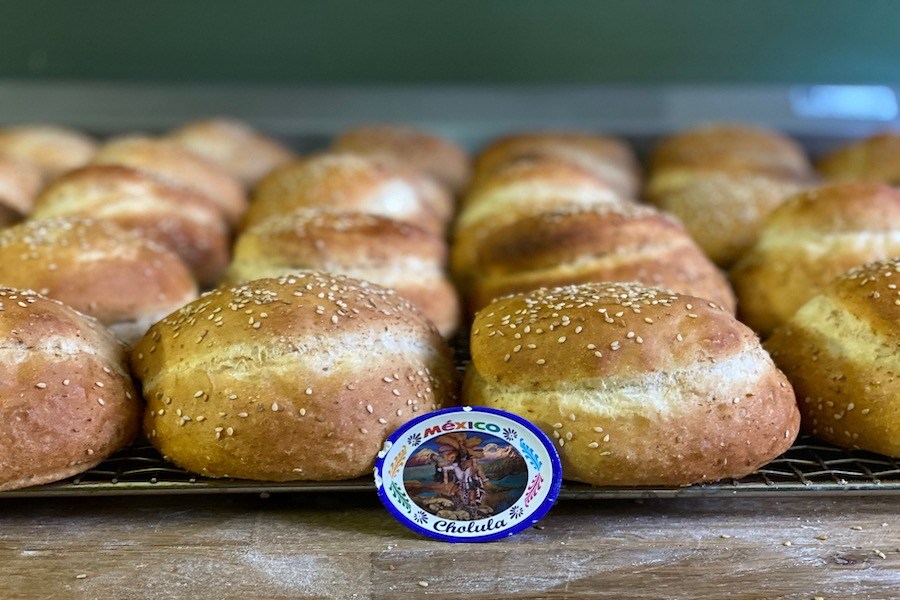
At El Chingon, which opens on South 10th Street in mid-September, cemitas are made using fifty-percent whole wheat flour and fifty-percent all-purpose flour, then baked in-house daily. / Photograph provided by El Chingon.
Like all good bakers, Juan Carlos Aparicio fusses endlessly over his buns. He’s constantly tweaking the timing of the rise, messing with flour types and amounts, and asking friends and family to shove a tray-full of carbs into their bodies for the sake of getting feedback. After a recent trip home to Puebla, Mexico, where Aparicio did nothing but bake cemitas for 10 days straight, he was sure he’d nailed a recipe to show off to all of Philadelphia ahead of opening his very first restaurant, El Chingon. “Guess what? I got back to Philly and it didn’t work,” Aparicio says. Back to the drawing board he went.
Aparicio grew up in San Mateo Ozolco, just west of Puebla — a small town that much of Philadelphia’s Mexican immigrant community calls home. After a five-year stint in New York City, he moved to Philly in 1999 and took a job at Buddakan as a pastry assistant. As he moved up the chain of command in various city kitchens in the 2000s, Aparicio built an impressive repertoire of French and Italian baking techniques — developing pastry recipes for Parc, then working on the opening team at Serafina in Center City, and eventually as the executive chef at Zavino Hospitality Group until February 2020. But Aparicio’s plan was never to follow someone else’s recipes. He was set on opening his own place where he could cook his own food and bake his own bread. “I wanted to do something that recognizes my roots, that could use all my experience with baking,” Aparicio says. “The city has so many different great Mexican places, but it was missing something. I felt that El Chingon had potential.”
Then, in 2018, Aparicio bought a building on South 10th Street with a first-floor space that was perfect for a restaurant. He recruited his brothers-in-law, Claudio Lorenzo and Antonio Hernandez, as co-owners, and kept dreaming up new baking ideas. The point of El Chingon, even in the beginning, was not to open a Mexican restaurant that just focused on tacos and food for Americanized expectations; Aparicio was determined to show off the range of Mexican baking.
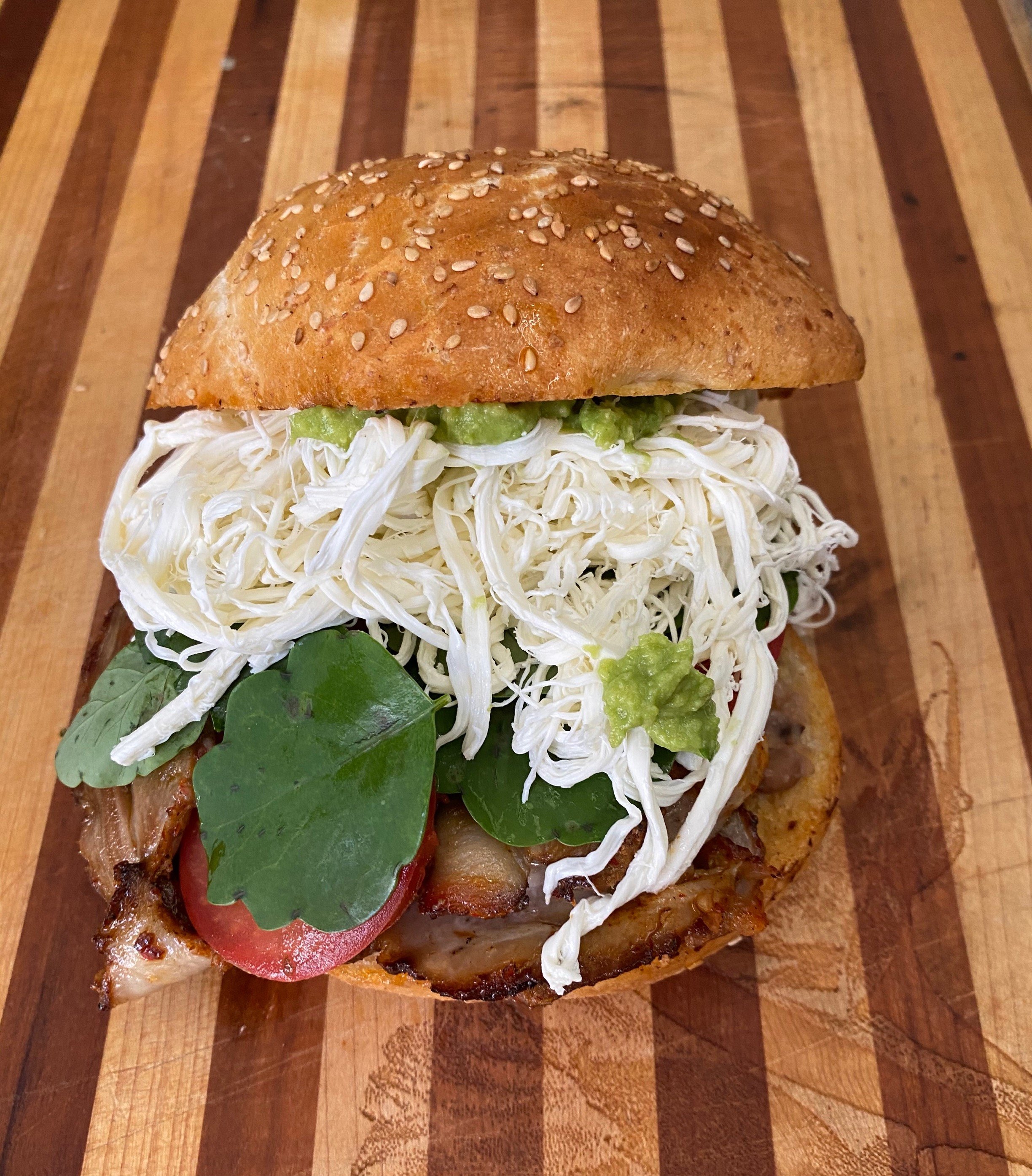
A cemita from El Chingon, filled with pork and queso Oaxaca / Photograph provided by El Chingon
El Chingon is set to open around the middle of September with a walk-in policy, 25 seats inside, and an all-day menu that dedicates much of its energy to flour-based bread products of the Mexican diaspora. Every day around lunchtime, customers will be able to order cemitas made with sesame-topped buns baked in-house and loaded up with things like fried meat cutlets, avocado, pápalo and queso Oaxaca. El Chingon certainly is not the first Philly restaurant to offer cemitas, but Aparicio says few spots (in Philly, or even in the mercados in Puebla) make the effort to bake the cemitas themselves.
For his cemita dough, Aparicio uses 50 percent whole-wheat flour and 50 percent all-purpose flour. After his visit to Puebla (where he developed the cemita recipe he felt so good about but ended up not transferring to his Philly kitchen), he adjusted the amount of flour in the dough, and his timing, and finally cracked the case. (For all you bread nerds: Aparicio mixes his dough at 10 p.m. and has it rest at room temperature so that by 5 a.m. the next day, it’s ready to start being worked and then eventually baked around 10 a.m.) “It has a lot of crunch in it,” Aparicio says of his cemitas. “It kind of has the texture of a baguette, but in a round shape.”
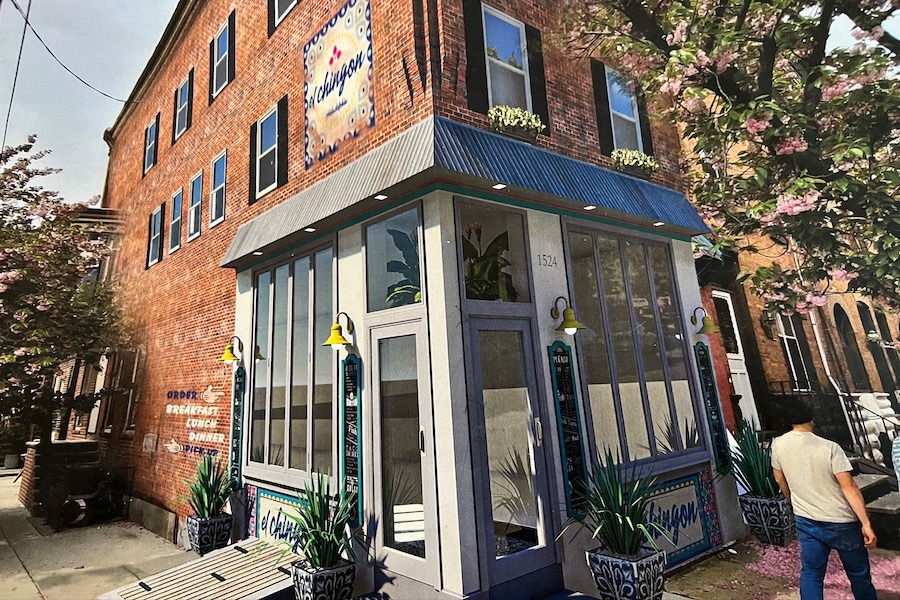
A rendering of the exterior / Photo provided by El Chingon.
The cemitas aren’t the only labor-intensive breads on the menu. Aparicio tells me he invented a concha recipe that uses charred corn husks pureed with sugar and turned into a topping. You can also expect sourdough flour tortillas made with Aparicio’s own 20-year-old starter to zhuzh up their taste. “When you eat it, you can actually taste the tanginess of the sourdough,” he says. “The depth of flavor is just more intense.”
Traditionally speaking, flour tortillas aren’t made with any active yeast component because they don’t need to rise or expand when baked. For his sourdough flour tortillas — which you’ll be able to eat in the form of tacos árabes made with pork that’s been marinated in sugar cane, vinegar and fresh herbs and then roasted on the trompo — he lets his sourdough tortilla batch-ferment in a cool spot so it doesn’t rise. Then he places each tortilla in a hand-press and quickly puts them on a griddle. The result is airy but not puffy, chewy but not doughy, he says. “I always felt like a flour tortilla is just kind of boring.”
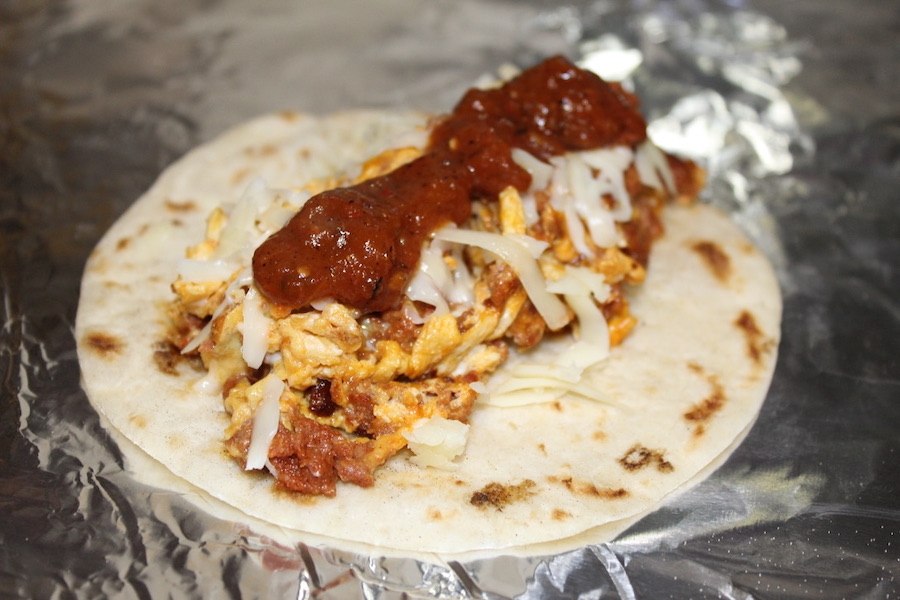
Taco Heart’s Austin-style breakfast tacos, which you’ll be able to customize to your taco heart’s desire starting in early September when the restaurant opens on East Passyunk Avenue. / Photograph provided by Taco Heart
If you told Nano Wheedan that you thought flour tortillas — the kind without sourdough — were boring, he’d probably invite you over to his South Philly stoop for a cup of coffee to talk it out. The man, a West Mount Airy native who spent 15 years in Austin, considers flour tortillas their own art form to be studied. Or at least that’s how he riffs about them. “The magical part, for me,” Wheedan says, “is when you put the tortilla on the comal and it blows up into the little balloon. It makes me feel like I’m a two-year-old boy again, like, ‘wow what is that?’” With his very own Austin-style breakfast-taco joint opening in East Passyunk, he’s hoping that he can make Philadelphians feel the same way about flour tortillas.
Wheedan first moved to Austin to become a rockstar — the acoustic guitar-playing type that sits on stages in coffee shops, dreaming of marginally larger audiences. When he first arrived, he was desperate for a bacon, egg and cheese equivalent in his new town. “I was so sad that there were no bacon, egg and cheese sandwiches. There was no bread,” Wheedan says. “Then I realized that the bread was the tortillas … I just didn’t know what to look for.”
Meanwhile, to pay the bills between gigs, he took a job at Homeslice, the pizza place that rose to stardom by bringing New York-style pies to Austin. Wheedan saw what Homeslice in Austin did for East Coasters longing for thin-crust pizza hundreds of miles from their homes. He fell in love with the notion that a restaurant could be more to its community — to its employees, to its neighbors, to its guests — than just a place to go eat food. In Wheedan’s eyes, a restaurant, maybe one day his own restaurant, could be a center for nostalgia and collective memory.
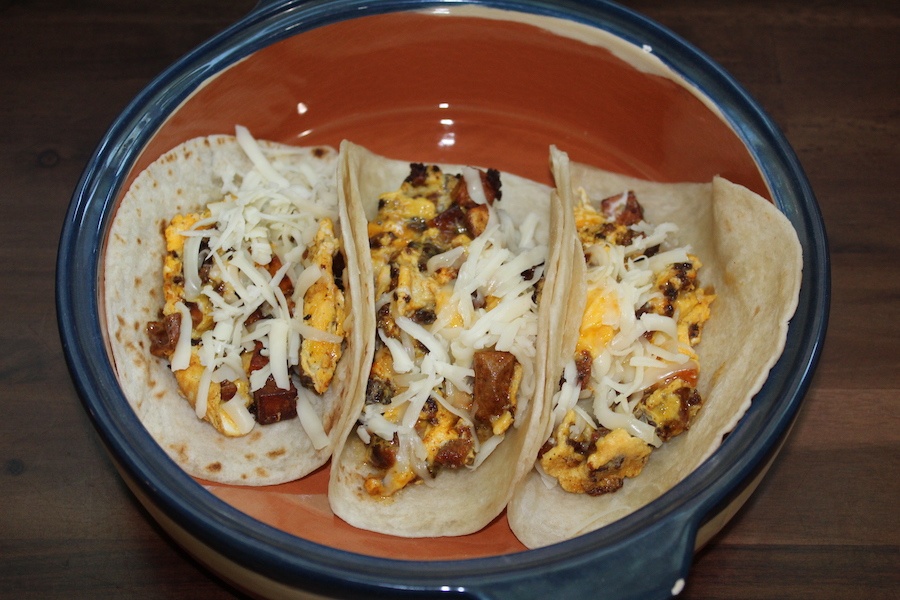
Once the pandemic hit, Wheedan moved back to Philly and used his stuck-at-home pandemic downtime to finesse his own flour tortilla-making process — which he first taught himself via YouTube in 2014. Like Aparicio from El Chingon, Wheedan spent an excessive amount of time rolling the dough on various surfaces, messing with the thickness, and adjusting how much heat to use. The result is a thick flour tortilla that puffs, tears and blisters, and is made with equal parts butter and lard.
Pandemic restrictions loosened slightly, and Wheedan signed up to help his buddy from Austin, Phil Korshak, with the operations side of Korshak Bagels. (Wheedan is a minority partner in the business.) Then, one Saturday when Wheedan wasn’t making or thinking about bagels, he decided to hand out free breakfast tacos to anyone who would take one on the sidewalk in front of his house. People took pictures of the tacos, posted them online, and Wheedan says he was soon inundated with messages from breakfast-taco-loving strangers: “I didn’t know that there would be people in Philadelphia who were missing tortillas, but I knew that this food does that for people.” But one can only make so many breakfast tacos out of their own kitchen — Wheedan says he maxed out at 85 tacos when he was still hand-rolling all of his flour tortillas at home. Wheedan and his breakfast tacos eventually moved to a space in the Bok Building, allowing customers to place orders ahead of time for migas, and chorizo, potato, egg and cheese tacos.
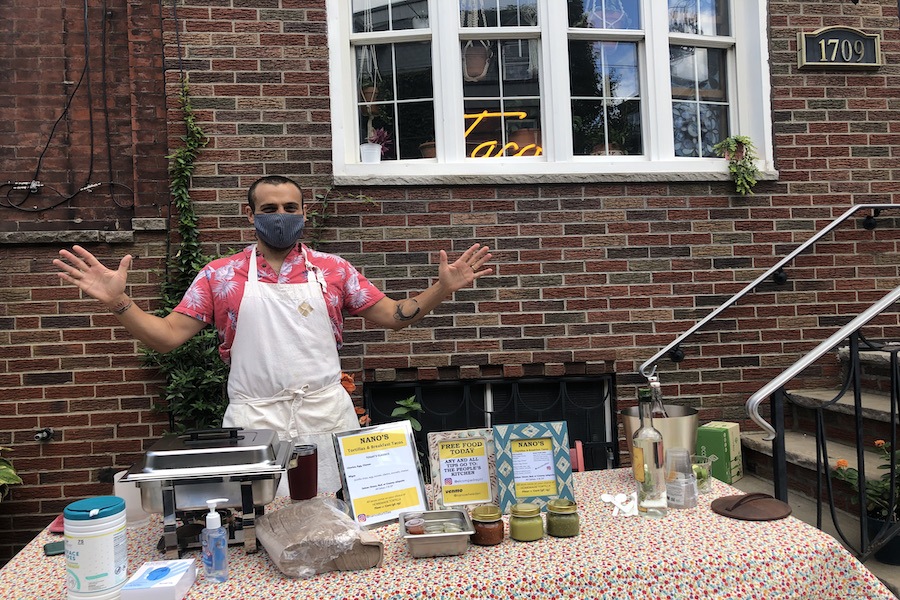
Nano Wheedan at a breakfast taco pop-up in front of his South Philly home / Photograph provided by Taco Heart
As much as Wheedan might find the process of rolling flour tortillas by hand to be a meditative act, he admits that hand-rolling isn’t a feasible business practice for his team at Taco Heart. “No matter how fast [a person can make a tortilla], if you are going to pay someone a living wage, the finances don’t work out.” In preparation to open Taco Heart, Wheedan purchased a flour tortilla press with a heated plate. (These are different than the hand-presses used for corn tortillas, since flour dough will shrink back in size as soon as you release the press, whereas corn tortillas will retain their size.) He’s drawing heavy inspiration from the the beloved Texan supermarket chain, H-E-B, which uses a San Antonio-made machine for its tortillas, puffs up tacos right in front of customers, and accommodates a whole range of breakfast-taco fillings.
Unlike many breakfast-taco joints across the country, Wheedan says he wants to focus on letting his diners personalize their tacos. At Taco Heart, there will be eight standard combos to choose between (think: bean and cheese; bacon, egg, cheese and avocado; potato and egg), but Wheedan’s intention is to get Philadelphians to mix and match fillings — to add spinach, for example, or remove the eggs entirely from the equation, throw in some refried pinto beans perhaps, and basically do whatever they want with their tacos.
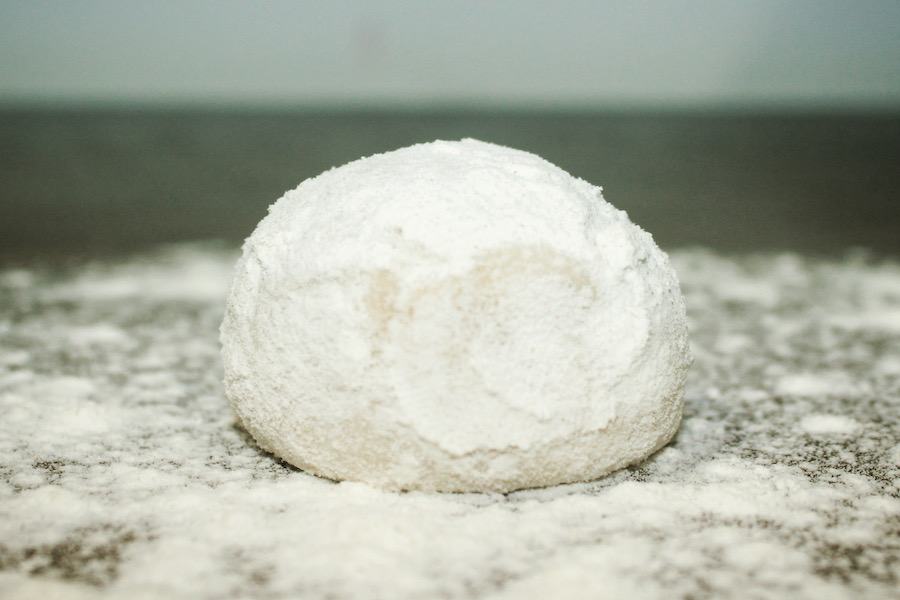
A ball of flour tortilla dough, waiting to go through the automatic press at Taco Heart. / Photo provided by Taco Heart.
Taco Heart’s flour tortilla recipe currently makes use of all-purpose flour, though Wheedan says he’s hoping to explore the possibility of working with small-batch, milled flour if the pricing ever becomes viable. His first priority, he says, is to invest in his staff’s wages. To that effect, customers at Taco Heart will be encouraged to order via kiosk in the restaurant or from their phones while en route — both as a way to cut down on labor costs and to create a better experience for diners. “A line is a thing these days. I do not want lines,” Wheedan says. “I want people to show up, get their food when they want it to be ready, and hang out with us.” The restaurant will offer counter seating inside as well as four tables and 12 chairs on the sidewalk during the warm weather. Anyone looking to pick up something extra for later — like salsas, Texas praline cookies and maracuja meringue pie — can grab their goods from a fridge near the counter.
Wheedan says he wants his breakfast tacos to make people feel cared for, whether they used to live in Texas or not. But it’s really the flour tortilla itself that he cares so deeply about. Come September, when El Chingon and Taco Heart open their doors to the public, Philadelphia just might start to feel the same way.


